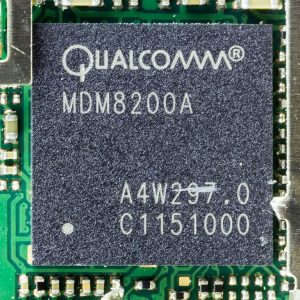
“Huawei E367, O2 Surfstick Plus – Qualcomm MDM8200A” by Raimond Spekking. Licensed under CC BY-SA 4.0.
On Monday, October 9th, San Diego, CA-based fabless semiconductor developer Qualcomm Inc. (NASDAQ:QCOM) announced that it had entered into a licensing agreement with Istanbul, Turkey-based General Mobile, a regional smartphone brand and a partner of the Android One smartphone project developed by Google. The royalty-bearing patent license grants General Mobile the right to develop, manufacture and sell 3G and 4G complete devices which incorporate technologies that are covered by patents in Qualcomm’s portfolio.
General Mobile has a regional focus but has expanded its operations and has a lineup of smartphone devices which it markets to customers in 35 different countries, according to Qualcomm’s press release on the licensing agreement. “The reach of General Mobile is extensive, and we are pleased to see their mobile devices powered by our industry leading technologies, serving consumers across Turkey and other parts of the world,” said Alex Rogers, executive VP and president of Qualcomm Technology Licensing, the IP licensing subsidiary of Qualcomm. Shares of Qualcomm stock were up slightly by 10 cents on the day of the announcement.
News of the successful licensing agreement in a foreign jurisdiction is interesting within the context of the legal barrage which Qualcomm has experienced this year over its patent licensing activities. This January, both the Federal Trade Commission (FTC) and Cupertino, CA-based consumer tech giant Apple filed lawsuits against Qualcomm over allegations that Qualcomm’s licensing activities run afoul of the company’s fair, reasonable and non-discriminatory (FRAND) obligations regarding its 3G and 4G standard-essential patents (SEPs). In mid-July, Santa Clara, CA-based tech giant Intel Corporation filed a public interest statement with the U.S. International Trade Commission (ITC) in response to the ITC’s institution of a Section 337 patent infringement complaint filed by Qualcomm against Apple. The statement from Intel doubled down on Apple’s argument that Qualcomm is trying to perpetuate an unlawful monopoly through its licensing activities.
Qualcomm has worked diligently throughout 2017 to oppose Apple’s allegations of unfair play in the marketplace. In April, Qualcomm filed a lawsuit in U.S. district court alleging tortious interference, claiming that Apple had mischaracterized both Qualcomm’s business model and product performance in order to encourage regulatory agencies in foreign jurisdictions to levy fines against Qualcomm. Such fines include a $912 million fine issued by the Korea Fair Trade Commission which a South Korean court upheld this September. To support its argument that it doesn’t violate FRAND obligations, Qualcomm’s Section 337 complaint filed with the FTC this July included the assertion of six non-SEPs against Apple which aren’t subject to FRAND obligations.
It’s clear that Apple’s machinations against Qualcomm’s licensing have been very damaging to the semiconductor developer’s bottom line. In Qualcomm’s earnings report for 2017’s third quarter, the firm reported Qualcomm Technology Licensing revenues of $1.172 billion for the quarter. That was down 42 percent from Qualcomm’s 2016 third quarter results when licensing activities brought the firm $2.038 billion.

![[IPWatchdog Logo]](https://ipwatchdog.com/wp-content/themes/IPWatchdog%20-%202023/assets/images/temp/logo-small@2x.png)

![[Advertisement]](https://ipwatchdog.com/wp-content/uploads/2024/04/Patent-Litigation-Masters-2024-sidebar-early-bird-ends-Apr-21-last-chance-700x500-1.jpg)

![[Advertisement]](https://ipwatchdog.com/wp-content/uploads/2021/12/WEBINAR-336-x-280-px.png)
![[Advertisement]](https://ipwatchdog.com/wp-content/uploads/2021/12/2021-Patent-Practice-on-Demand-recorded-Feb-2021-336-x-280.jpg)
![[Advertisement]](https://ipwatchdog.com/wp-content/uploads/2021/12/Ad-4-The-Invent-Patent-System™.png)







Join the Discussion
No comments yet.